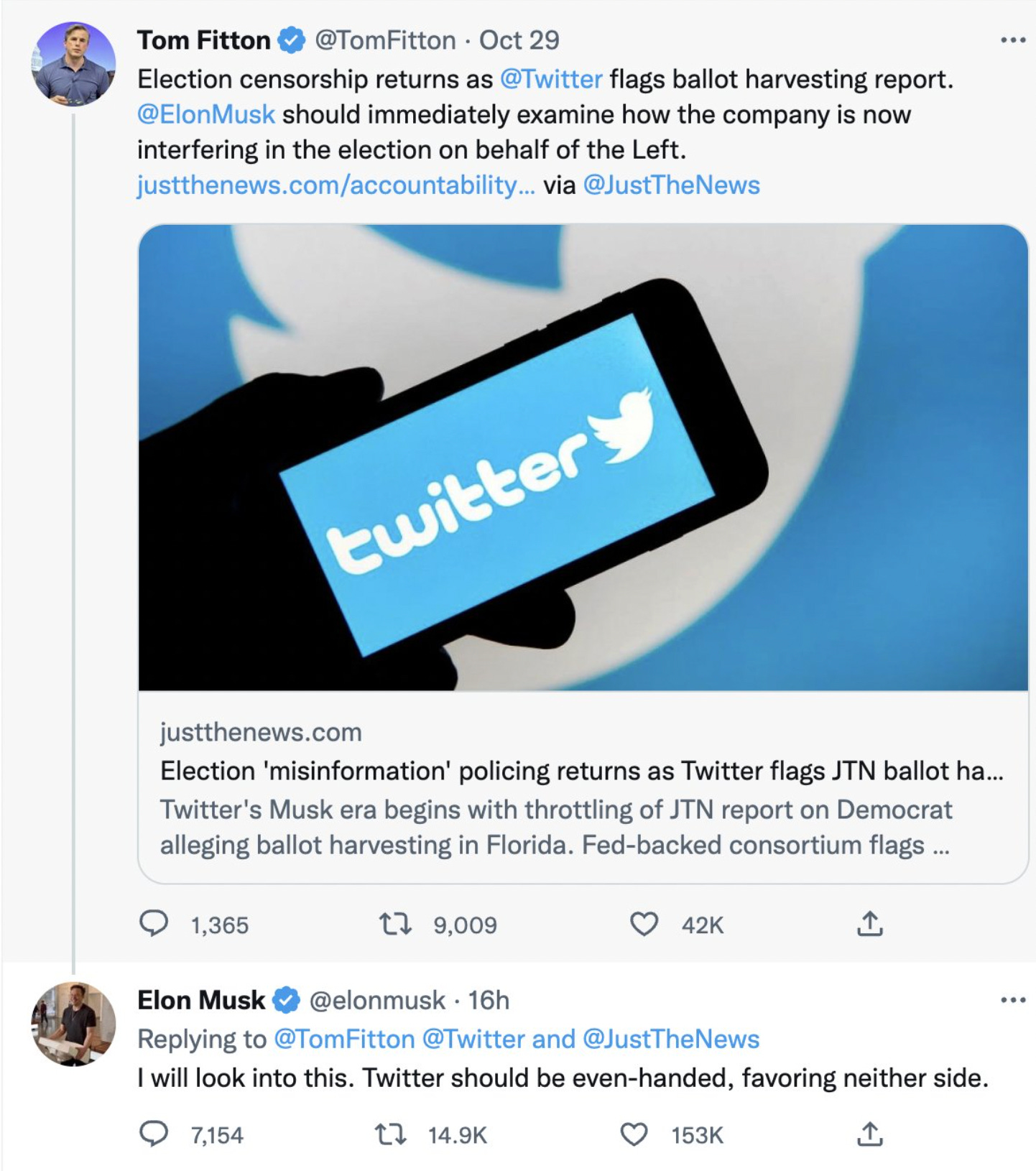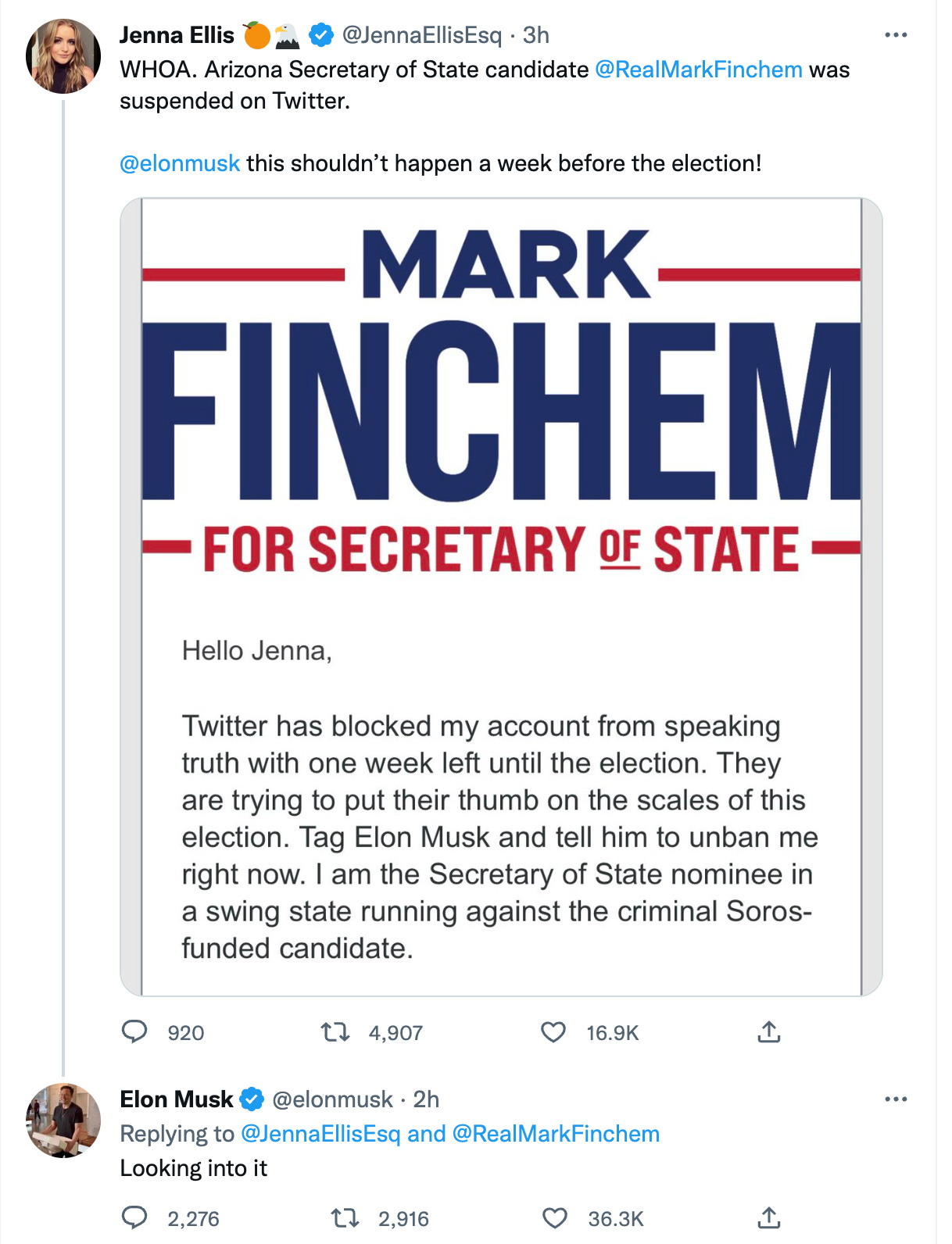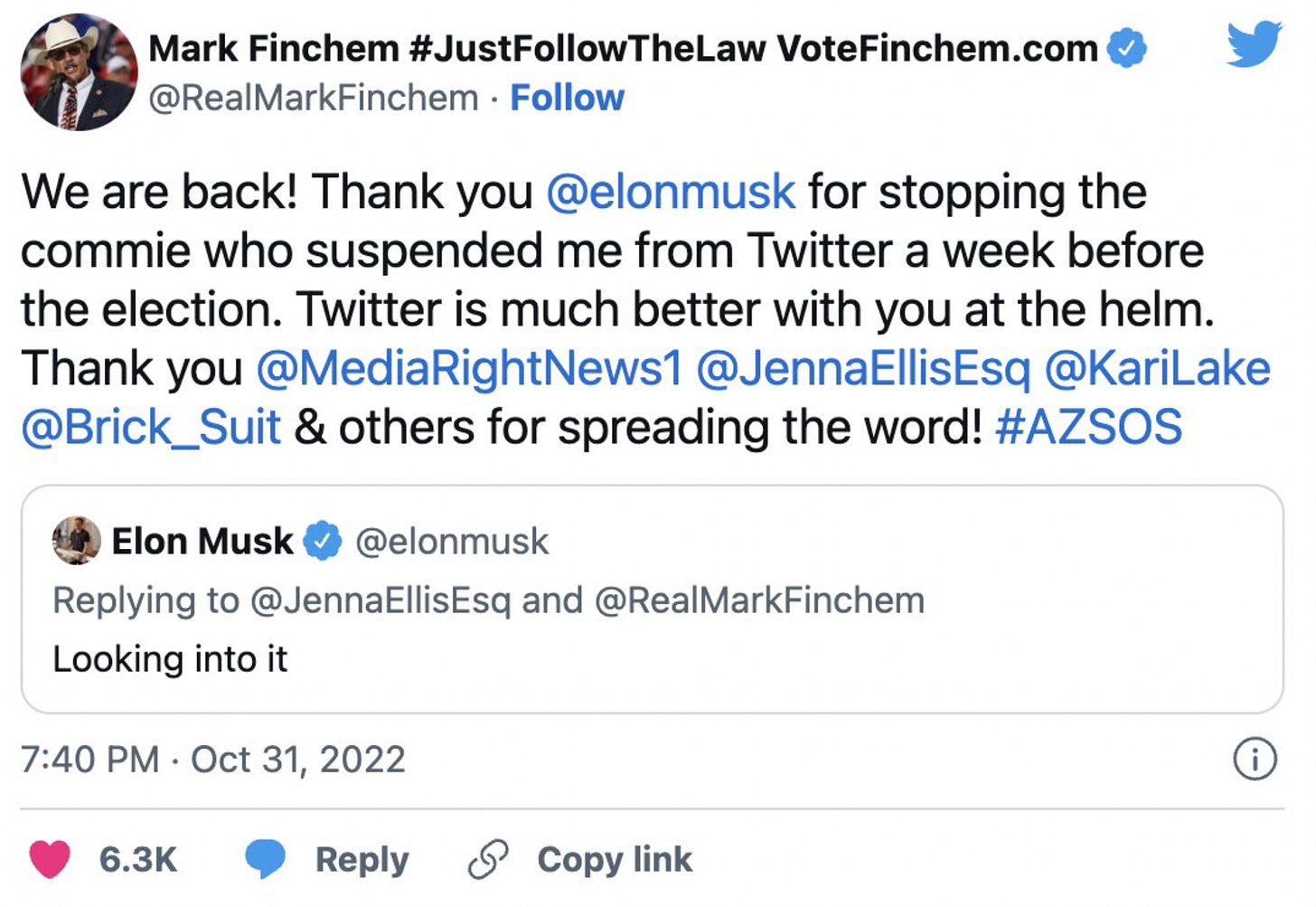If you have been reserving judgement about Elon Musk’s tenure at Twitter, this opening Halloween weekend has been scary eye-opener, with the Chief Twit living up to his self-anointed title.
Three big problems jump out.
1. Musk does not care about democracy, caters to election-deniers
Musk says he was motivated to buy Twitter because of concerns about free speech, with the implication that he thinks Twitter has been willing to curtail the speech of conservative figures. The digital public square must be open to all!
His ideal of free speech appears to be that short of illegal threats of violence, people should get to say what they want. He is indifferent as to whether it is true or not, or whether the speech is intended to undermine democracy or not.
One the biggest threats to America today is declining faith in democracy. Republican elites and Trump supporters, especially after 2020, keep telling the public that elections can’t be relied upon because of massive fraud. One recent poll found that two-thirds believe Biden’s 2020 election victory was illegitimate. This Big Lie has been effective because it has been repeated long enough and frequently that people believe there must be something to it, and Republicans have been willing to sign on to it. Election deniers have used social media to amplify a message that most traditional media would debunk.
In his opening weekend, Musk signaled a certain allegiance with two actors centrally involved in the Big Lie.
Let’s start with Tom Fitton, President of Judicial Watch, who regularly spouts election fraud and other types of conspiracies.
The January 6th Commission found that Fitton was also in contact with Trump and encouraged him, before election day, to simply declare victory when he was ahead and ignore votes that were legitimately cast but counted late. This is precisely the tactic that Trump followed in his effort to overturn the election.
Fitton complains that Twitter is censoring his misinformation efforts. Musk personally responds, saying that Twitter should be “even-handed, favoring neither side.”
In other words, Musk sees Fitton as an equally credible and legitimate source of information as the New York Times, or perhaps more so, since he also joked that the Times was fake news over the weekend.
Maybe Musk does not know who Fitton is. But he has a habit of responding to right-wing conspiracy theorists on twitter as if they were credible actors, in a way that he does not respond to more moderate or left-wing voices.
Two days after he responded to Fitton, Musk was at it again. This time he replied to Jenna Ellis, who was acting on behalf of Mark Finchem, a candidate for Secretary of State in Arizona who had his account blocked.
Ellis is a former traffic lawyer who became part of Trump’s legal team. She did not just spread false election fraud claims; she tried to persuade state politicians not to certify election results and drafted a memo urging Mike Pence to overturn the election. She now works for another election denier, Doug Mastriano in Pennsylvania. Finchem is a straight-up election denier. If he wins his campaign as Secretary of State, he will be able to do what he could not do as an Arizona state legislator: create the basis to refuse to certify a free and fair election because it was won by a Democrat.
I don’t know the details of why Finchem was suspended, but Musk personally promised he would be “looking into it” and a couple of hours later Finchem was back on the site, thanking Musk.
While a lot of the speculation of Musk’s acquisition of Twitter has centered on whether he will allow Trump back on the website, this misses the broader picture: Musk views election deniers as a critical stakeholder group that he must personally cater to. It is hard not to assume this reflects a deeper indifference, or even hostility to, American democracy.
Ahead of the midterm election, Musk has suspended the ability of Twitter staff to moderate content.
2. Musk will amplify conspiracy theories
Election denial is part of a broader problem of conspiracism in America. One side of the political spectrum has lost touch with reality and invented an alternate world, one where elections were stolen, where vaccines are part of a global plot to control our body, where Democratic elites are part of a cult that traffics children as part of a sex ring, where there is a massive global elite nefariously organizing to control you.
These were just some of the unfortunate beliefs of David DePape. Last Friday night DePape broke into Speaker Nancy Pelosi’s home, with zip ties, a hammer, and duct tape. His plan was to force Pelosi, whom he saw as “the ‘leader of the pack’ of lies told by the Democratic Party” to admit the truth of his conspiratorial beliefs. If not, he planned to use the hammer to kneecap her, so other members of Congress could observe the consequences of their lies when she was wheeled back into Congress. As it was, he used the hammer to fracture the skull of Pelosi’s 82 year old husband, who remains in intensive care.
DePape is bad news for far-right media, serving as the personification of how bizarre conspiracy theories they have promoted lead to extreme action, in this case political violence. And so the same conspiracy machine that created the lies that DePape believes in cranked into action. When it was clear that his attack could not be told as part of a broader crime wave they were already promoting, another story emerged: that DePape and Paul Pelosi were gay lovers whose drunken tryst had gone wrong. This was all over Twitter by Saturday. See this excellent thread by Matt Gertz to explain how the new conspiracy theory took off, and how it will endure even after it has been debunked.

By Sunday morning, Musk was amplifying the conspiracy theory in reply to Hilary Clinton. Clinton had posted that “hate and deranged conspiracy theories” had driven Pelosi’s attacker. Musk replied “There is a tiny possibility there might be more to this story than meets the eye.” His source: an online website, the Santa Monica Observer, which has a record of posting fabrications. Indeed, the Santa Monica Observer once published a story that Clinton had died in 2016, and had been replaced by a body double since then. Not exactly a reputable source, but reputable enough for the owner of Twitter, a many with 112 million followers, to share.
Facing pushback, Musk deleted the tweet. But the damage was done. Musk and others have given those already invested in a conspiratorial worldview enough raw material to deny the reality of what happened, rather than acknowledge the danger of that worldview.
Just a couple of days before Musk had promised advertisers that Twitter would not devolve into a “free for all hellscape” but he seemingly cannot help himself. Musk is not just the owner of Twitter, he is an heavy user, as addicted to the rest of us. In particular he is a specific type of user: a troll who likes to take provocative positions, and then watch the responses. There is doubtless some enjoyment in being the biggest shitposter on Twitter, but it runs contrary to the responsibilities of owning the platform.
3. Musk will impose a tax on credibility
The final reason for concern is Musk’s plan to ask users of Twitter’s blue-check verification system to pay for the privilege at a cost of $240 a year. [Update: Musk is now proposing $96 per year].
There are two aspects to this plan worth noting.
The first is that it seems like a terrible business decision. How many people will really pay more than the cost of their Netflix subscription to be a member of social media? Musk seems to believe that the previous owners of Twitter, who were smart enough to get him to vastly overpay for the website, were too dumb to take advantage of this revenue stream. Similarly, other social media companies seem to have missed out on such a subscription opportunity. But Musk knows better apparently.
The Twitter production model is pretty simple. It provides a platform, and users provide content. The content, and experience, depends on users. About 90% of that content is produced by just 10%, meaning that heavy users contribute disproportionately. I don’t know the overlap between blue check status and heavy users (and Musk has complained that users with the most followers, like Barack Obama, don’t tweet enough), but my guess is that it is high, since blue checks are disproportionately journalists who drive conversation and news on the website.
There are about 423,000 verified accounts (to judge by @verified). Even if half of them were willing to pay the proposed $240 per year fee (an estimate I think is very optimistic), that only covers $50 million. That is not a lot of money to risk losing key content providers, and it does not put much of a dent in Musk’s reported 1 billion per to simply service the loans he took out to purchase Twitter.
I have a blue check — I know, I know — and like many others have some misgivings about providing a lot of content for free to a website that is often terrible. I am not alone in thinking that being asked to help the richest man in the world cover his terrible investment decision is a bit much.


The second and more important reason why this seems like a terrible idea is that the verification process is a service to Twitter users, not to the owner of the blue check. If Maggie Haberman or Matt Yglesias tweet something out, you can feel reasonably confident that they are the ones tweeting it out. Maybe the content of what they tweet out is wrong, but the blue check makes you more confident that they are at least putting their name and reputation behind it.
People do impersonate well-known accounts, or create plausible fakes. For example, Russia ran the @TEN_GOP Twitter account to impersonate a state Republican Party account for a sustained period.
Anyone can claim to be a journalist.


Losing the blue check removes one more barrier to impersonation and misinformation. Given Musk’s stated interest in reducing bot activity on the website, making user impersonation easier, and credible sources of information harder to discern, seems contrary to this goal.
[Update: some reporting suggested that Twitter would not require an identity as part of the new verification process, making it a whole lot harder to sort out claims of user impersonation that Musk started to become interested in when people started impersonating him. Overall, the blue check is being dangled as some sort of elite status — “Your account will get a blue check mark, just like the celebrities, companies, and politicians you already follow” — to compel users to pay $8 for an unrelated subscription service that does not offer much benefits beyond boosting replies over the lowly plebs.]
The dog who caught the car
There is lots more I did not talk about here, which pose long-term concerns. It turns out that Saudi Arabia, which has a bad habit of throwing people in jail for tweeting the mildest political discontent with its leadership, is the second largest owner of Twitter. Musk’s business interests with China and Russia create a massive conflict of interest. See Greg Sargent for a deeper discussion of the geopolitical implications of Musk’s ownership of Twitter.
Musk has talked about a long-term vision, but his short-term actions are of a guy clicking too hard, too frequently on a reset of a company whose product he consumes, but which he does not really understand. Whatever vision he has is marred by an inability to distinguish between credible sources of information and conspiracies, his own hubris, and an indifference to the negative externalities he produces.
Musk is the dog who caught the car, and is now shitting in the car while asking the drivers to personally pay him for the service.






